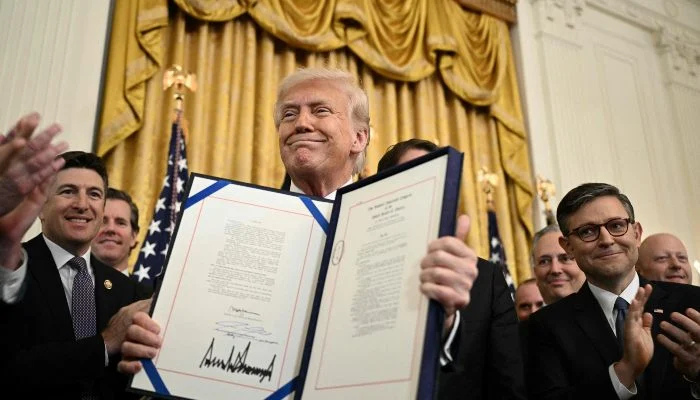Islamabad, 20 July: US President Donald Trump has signed into law the GENIUS Act, a landmark bill that creates a federal regulatory regime for dollar-pegged cryptocurrencies known as stablecoins. The move is widely seen as a pivotal step toward mainstream adoption of digital assets for payments and money transfers.
According to CGTN and other international news outlets, the bill—formally titled the Guaranteed Electronic National Infrastructure for US (GENIUS) Act—passed the House of Representatives with a bipartisan vote of 308 to 122. It had earlier cleared the Senate.
The White House described the legislation as a historic milestone that will “pave the way for the United States to lead the global digital currency revolution.”
Key elements of the law include strict consumer protection measures, full reserve requirements, and public disclosure obligations. The act mandates that all stablecoins be backed 100 percent by highly liquid assets such as US dollars or short-term Treasury bills. Issuers must also publish monthly reports detailing the composition of their reserves.
READ MORE: Trump-Backed World Liberty Financial Signs Deal to Promote Blockchain in Pakistan
The White House said the act prioritizes consumer protection, reinforces the US dollar’s role as the world’s reserve currency, and strengthens national security. “This legislation will make America the undisputed leader in digital assets, bringing massive investment and innovation to our country,” the administration stated.
US Treasury Secretary Scott Bessent echoed this view, stating the law would expand access to the dollar-based economy and increase global demand for US Treasuries, which are used to back the value of stablecoins.
Stablecoins are digital tokens that aim to maintain a fixed value—usually pegged to the US dollar. Originally popular among crypto traders for transferring funds between tokens, they are now being positioned for broader commercial use, including fast, cross-border payments.
Industry experts and crypto companies have welcomed the move. Many believe that a clear regulatory framework will boost the credibility of stablecoins and encourage adoption by banks, retailers, and consumers. According to Standard Chartered Bank, the stablecoin market—currently valued at over $260 billion—could grow to $2 trillion by 2028 under the new law.
The bill’s passage follows years of lobbying by the crypto industry, which contributed over $245 million in campaign donations during the 2024 elections to support pro-crypto candidates, including Trump, according to Federal Election Commission data.
However, the GENIUS Act has also triggered concern overseas. Italy’s economy minister, Giancarlo Giorgetti, warned in April that the rapid adoption of dollar-backed stablecoins could pose a risk to Europe’s financial stability. “Even more dangerous is the new US policy on cryptocurrencies,” Giorgetti said, suggesting the move could lead to market volatility and geopolitical friction.
Read more: Pakistan Leads Cryptocurrency Adoption Across Asia-Pacific in 2025
Warwick Powell, adjunct professor at Queensland University of Technology and senior fellow at the Taihe Institute, wrote in CGTN that the act could increase global financial risks. He argued that transforming US public debt into collateral for a new form of private money—without robust oversight or public accountability—could destabilize financial systems.
The GENIUS Act marks a significant shift in US digital currency policy, aiming to secure global leadership in financial innovation. While welcomed by investors and technology advocates, the long-term implications of this new regulatory landscape remain to be seen.









